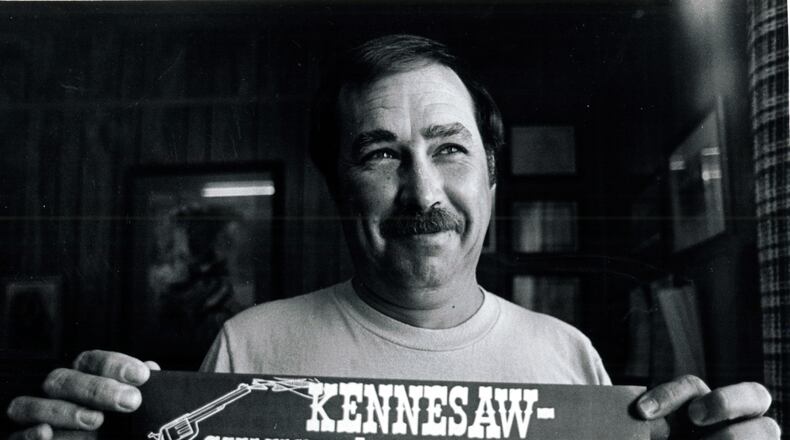Go to MyAJC.com/metro to see more photos related to Kennesaw’s 32-year-old gun law.
With Georgia House Bill 60 going into effect July 1, the nation, if not the world, is weighing in on gun legislation in the Peach State. The so-called “guns everywhere” legislation specifies where Georgia residents can carry weapons. Included are provisions that allow residents who have concealed carry permits to take guns into some bars, churches, school zones, government buildings and certain parts of airports.
This isn’t the first time Georgia gun laws have caught global attention. The Photo Vault looks back 32 years ago when an ordinance in Kennesaw required every head of household to possess a firearm and ammunition.
The law, which went into effect May 1, 1982, was passed, at least in part, in response to the actions of Morton Grove, Ill., which had just adopted an anti-gun ordinance. Since then the small town with strong Civil War ties that touts a locomotive, the General, among its most famous residents, has morphed into a thriving suburb and university town.
A 1985 article in Penthouse magazine on Kennesaw, titled “Gun City, ” pictured staunch gun owners in military-like garb, a stereotype that city leaders contend belies a growing town of professionals and homeowners.
In 1990 a shooting rampage at Perimeter Mall by a former mental patient prompted metro area mayors to call for gun-control laws. And, as in the past, Kennesaw officials refused to flinch, spurning a request by Atlanta Mayor Maynard Jackson that all metro counties and cities enact a waiting period for the purchase of guns.
Many see the law as more of a political statement because exemptions for conscientious objectors, disabled people and convicted felons really make it unenforceable.
When the ordinance was passed, the American Civil Liberties Union immediately filed a challenge to the constitutionality of the law in federal court and lost.
While the stated purpose of the law is to “protect the safety, security and general welfare of the city and its inhabitants, ” whether it actually deters crime is a matter of speculation.
Proponents of the law tout low crime rates and a high influx of residents as proof that it makes honest people feel safe and criminals leery.
About the Author


